- Home
- Gavin Chappell
The Hadrian Legacy
The Hadrian Legacy Read online
The Hadrian Legacy
GAVIN CHAPPELL
Copyright © Gavin Chappell 2016
Cover art by FollowingHadrian
All rights reserved. No part of this book may be reproduced or transmitted in any form or by any electronic or mechanical means, including photocopying, recording or by any information retrieval system, without the written permission of the publisher and author, except where permitted by law.
The right of Gavin Chappell to be identified as the author of this work has been asserted by him in accordance with the Copyright, Designs and Patents Act 1988.
Published by Schlock! Publications 2016
ISBN-13: 978-1540537812
ISBN-10: 1540537811
This book is a work of fiction and any similarities to actual persons and/or places are purely coincidental.
Schlock! Publications
www.schlock.co.uk
In the same series:
On Hadrian’s Secret Service
Murder in Hadrian’s Villa
By the same author:
Crocodile and Leopard
The Man Who Sold the Roman Empire
A Song of the Legions
The crystal gong of the silence
Shivers in shattered shards;
And the marble hall re-echoes
To the tread of the crested guards.
Fingers pluck at the hangings,
White in the purple gloam;
Midnight lies with the sleepers
In the pulsing heart of Rome.
Rosy lips smile in slumber,
Arms nestle bodies white—
Rome in her silks and marbles
Sleeps through the soft-lipped night.
Echoing down the heather
The restless trumpets call,
Questioning each of the other
Down the line of the winding Wall.
Eyes strain hard in the darkness,
To the pulse of an echo blown—
Rome is of gold and iron
But a soldier is flesh and bone.
Fires in the hills are burning,
To the far off throb of a drum;
Through the ghostly waving heather
What phantom figures come?
Shadows or painted warriors?
The death drums never cease.
Stand to your watches, legion,
That Rome may sleep in peace.
Beacons burn in the towers,
Eyes straining hard beside,
Ears a-tune to the murmur,
The sigh of each changing tide.
Was that the shrill of a night bird
Where the waves are grey as steel,
Or the grind of a muffled oar-lock,
The wash of a prowling keel?
Driftwood or sword-fanged sea-wolves,
Not yours is rest or ease;
Stand to your watches, legion,
That Rome may sleep in peace.
- Robert E. Howard
—1—
Roman Province of Britain, 123 AD, 1 January
‘This whole enterprise is costing far too much.’
The procurator’s voice boomed from the stone walls of the gloomy, torch-lit staircase, audible despite the thump of booted feet on the steps as the guards followed close behind. The procurator’s clerk shot his superior a nervous look. Such talk could be considered critical of His Imperial Majesty; it wouldn’t do either of their careers any good if they were linked with sedition. There had been too much of that in this island.
‘The northern tribes have been pacified,’ the procurator continued peevishly as they started up the second flight of steps. ‘The emperor himself deems the province safe enough to leave it for warmer climes. He’s in the East now, negotiating with the Parthians.’ An overweight, red-faced man, he puffed and panted as they ascended.
The other end of the empire, the clerk thought. Hot, desert sands and bustling cities, not wet moorlands and rebellious tribes. How he had ended up with this posting he would never know, but he realised he needed to cultivate friends in high places when he got back to Rome. And how could he hope to, if his superior kept talking like this?
They turned up another flight. Now the clerk saw daylight through the door that led out into the parapet. With it came a bitterly cold draught. How he hated this climate!
‘The costs of construction alone are beggaring the province.’ The procurator was off again. ‘The forts to the south are seriously undermanned, what with so many cohorts involved in the building work. What if something happened in the south? It’s happened before; in the Emperor Nero’s day. What if…’
They came out into blinding daylight. A harsh cold winter wind seized the procurator’s equestrian toga and whipped it over his head. Seizing hold of both his toga and his dignity, the procurator led the clerk and the guards out onto the rampart. Auxiliaries of Dumnorix’s Troop stood waiting for them, the prefect and several troopers. The clerk saw the red tiled roofs of the barrack blocks below. And through a gap between two crenellations, the endless rolling heather stretched into the misty distance.
The auxiliary prefect, a bearded Gaul, held his hand out in greeting. Even as he did, one of the troopers, a decurion, drew a sword and slid it briskly into the unarmoured breast of the procurator.
Gasping, the clerk seized hold of the rampart for support, obstructing the guards as they dashed forwards to grab the assassin. While they tangled with the fainting clerk, the decurion turned to the bearded prefect. The prefect drew his own sword and cut him down. A look of shock on his face, the decurion fell, smearing blood across the stones as he rolled off the parapet.
He landed with a crash on the gravel pathway below. Shouting men ran to his side. One rolled him over but he did not move. The man looked upwards in perplexity.
The centurion in charge of the guards reached his master’s side. Sightless eyes stared up at the grey skies, chalk white hands felt at the wound, the freshly laundered toga suffused with crimson. ‘The cost,’ the procurator said clearly and distinctly. ‘It’s too much.’
He might have been talking about construction expenses, he might have been talking about his own death. The centurion would never know. The procurator’s head rolled back, a final gasp trailed from his lips, and he lay there, limbs awry, a lifeless, leaden weight, somehow diminished by his death. Softly the centurion laid him down and approached the auxiliary prefect.
‘You’re under arrest,’ he announced.
‘What’s this?’ the prefect said, his Gaulish accent thick. He put a hand to his ear. ‘I don’t understand your Latin.’
The centurion gave him a thin-lipped smile and nodded to his men, who seized the man. Incensed, the other auxiliaries surged forwards. The centurion turned around and barked, ‘Stand down! Your prefect is now under arrest!’
‘Under arrest?’ the prefect said. He gestured at the decurion’s body lying in a broken heap at the bottom of the wall, surrounded by scared looking men. ‘I killed the traitor who brought dishonour upon our troop!’
‘Yes,’ said the centurion, slipping his thumbs into his belt. ‘Very fucking convenient. Your chum kills the procurator of the province and you cut him down before he can be questioned.’ He gestured to his men. ‘My men will be taking over this fort until I get to the bottom of this. Tell them to stand down and accompany me to your quarters.’
The prefect led them back down to ground level, issuing orders to his men as he came out into the open. The centurion followed, scowling, while his men carried the procurator’s corpse. The clerk, who had recovered from his faint, came behind them, giving nervous looks as auxiliaries followed them into the courtyard.
The centurion didn’t believe the prefect was as stupid as
he was acting. How had he been promoted if he was that thick? It was all very worrying.
The procurator’s body was laid out on the table of the prefect’s quarters, his dead assassin dumped on the paillasse. The centurion sat the prefect down on the only stool in the room and perched himself on the edge of the desk. Guards filled the room, more outside kept an eye on the auxiliaries. The clerk leaned against the wall, staring at the procurator’s corpse. The centurion’s optio examined the body of the assassin.
‘You must understand,’ the centurion told the prefect, ‘that you made yourself look like a suspect when you killed this man. Maybe it was a spur of the moment thing. Maybe you were angry about him shaming your troop. But it doesn’t look like that, does it, mate?’
The prefect put a hand to his mouth. The centurion frowned suddenly, and leaned forwards. The optio glanced up, and held out his hand.
‘Look, sir!’
The centurion turned irritably to him. His eyes widened. He snatched the object from the optio’s hand, and turned to the prefect, shaking it at him. It was a glassy stone as big as a crab apple, with a hole through the middle.
‘What in Hades is this?’ he barked.
The decurion’s eyes bulged. Abruptly, he pitched forward and fell to the ground at the centurion’s feet, frothing at the mouth. The centurion dropped the stone which rolled away towards the clerk, and grabbed the prefect’s arms.
‘What’s got into the man?’ the optio yelled.
The prefect stiffened suddenly, then slumped back.
‘Dead,’ said the centurion. He rose, and turned towards the clerk, who had picked up the stone. ‘Give me that,’ he commanded. ‘No word of this to anyone, got that? My report will be sent by imperial courier to the highest authorities. And this stone will be going with it. South. To Rome.’
—2—
Baiae, Italy, March 15
The sunlight danced on the waters of the Bay of Naples. High above, a bright sun blazed in a cloudless blue sky; in the town below, light glimmered dazzlingly from the domed roofs of temples. The streets were empty of shoppers, and barely a shadow was visible. Beggars and stray dogs lay curled up in what shade remained, twitching wearily at flies. It augured a hot summer.
The wine shop was cool and shaded. Gaius Flaminius Drusus sat propped against the bar, sipping at his wine and gazing downhill at the lazily lapping waters. Spring flowers filled the air with their scent, almost drowning out the rank smell of spilt wine and cooking food. But the wine this establishment sold was anything but rank when fresh. In Baiae, playground of the richest Romans, everything was of the finest.
And the girl who served behind the bar was not the usual bar slattern Flaminius was accustomed to, in the bars of Rome or those noxious stews he had patronised while with the legions. How could an auxiliary tribune, seconded to the Praetorians but drummed out within a year, now living off a few savings, get by in such an atmosphere?
During a lull in his career brought about by the displeasure of the emperor himself—all in the line of duty! —he had prevailed on the hospitality of an old acquaintance from his days in the legions. Lucius Aemilius Karus had also been a tribune back then, though commanding the first cohort, not a mere troop of auxiliary horse like Flaminius; it had been the first step in the direction of a still elusive career as a senator. Now he was hankering after some official post, and after a recent inheritance he was celebrating lavishly in the famous resort while cosying up to more powerful men. And Flaminius had come visiting.
Truth to tell, they’d not been best of friends back in the good ol’ days of the late lamented Ninth Legion. But after Flaminius’ elevation to hero status on rescuing the emperor (before he embarrassed Hadrian with word of his imperial wife’s intrigues) Karus had thought Flaminius a man whose hand it was good to grease, and accordingly invited him over for Saturnalia. Flaminius had stayed all winter, keeping recent events very much under the rose while he sponged off the chinless wonder. A man had to live. Right now, the only alternative was his father’s farm up in the hills. After a few years of high adventure among the barbarian nations, he couldn’t face that.
Flaminius smiled at the girl. ‘Another wine, if you’d be so good,’ he said. She poured him one from an amphora, mixing it with honey and water as he watched.
Karus was visiting the villa of an older man, a senator whose patronage he hoped to earn. Growing bored sitting in the atrium reading scrolls and getting under the slaves’ feet, Flaminius had strolled into town. Out of season, and at noon, Baiae proved was as dull.
With a sigh, he returned to his aimless perusal of the street. A man was dismounting from a horse, having just ridden in from out of town. He wore the plumed helmet and red cape of a centurion, and looked out of place in this sybaritic setting. After hitching the beast to a nearby post, he turned round.
A shock of recognition ran through Flaminius. Gasping for breath, he ducked behind the pillar and peered out. The centurion was walking up the main street in his direction. No, not here! He was on leave, indefinite leave. Compassionate leave, after what had happened. He wanted nothing more to do with…
Today was a black day in the Roman calendar. The Ides of March.
The girl was looking at him quizzically. Two old men drinking morosely together on the far side—the bar’s only other clientele—were also watching.
He went to the bar. ‘Is there another way out of here?’ he asked urgently.
‘Through the kitchens,’ the girl said in surprise, pointing. ‘But… oh! You can’t go through there!’
Moments later he was in the alleyway at the back, angry shouts of the wine shop’s owner ringing in his ears. He looked left and right, chose right. In a matter of moments, he was on the main street out of town, heading up into the hills.
By the time he reached Karus’ villa, his hair was wet with sweat and he had a headache, maybe sunstroke. Stupidly, he’d left his hat in the bar. At least he’d got away. He took a dip in the pool to wash away the grime of the road, then went to the library to find something to read.
Karus returned later that afternoon, when it was cooler, carried into the main courtyard in a litter by slaves. Flaminius sat in the library drooping over a scroll.
‘There you are, old man,’ Karus said in a subdued manner. ‘What’s that you’re reading? Oh—The Wonders Beyond Thule! Thank Jove, I was worried it was some philosophical text.’ He gestured at the pigeon holes that honeycombed one wall. ‘My late father collected masses of them. Fearful rubbish. I think he even read some.’ He clapped his hands and a slave silently appeared through a drape. ‘Wine, for me and my guest. And some snacks before dinner.’
The slave returned soon after, and Flaminius sipped his wine with relish. One thing to be said for Karus, he kept an excellent cellar—or his late father had.
‘And how did you spend your day?’ Karus asked. ‘I was brownnosing powerful senators. A certain old man old enough to know better was drooling over me like I was a pretty slave boy.’
‘I did nothing very much.’ Flaminius helped himself to a plate of honey cakes scattered with sesame seed. ‘In the morning I popped into town, and in the afternoon I came back.’
‘My slaves reported that you looked agitated on your return,’ Karus commented. ‘Did you not have your usual success amongst the local married women?’
Karus was making a clumsy reference to an episode a few years back. ‘The lady you’re thinking of wasn’t the governor’s wife, she was his dancing girl. Besides, she’s... not around anymore…’ That memory was another reason why Flaminius had run that afternoon.
The slave returned. Karus scowled. ‘I didn’t summon you! Get out!’
‘Apologies, master,’ the slave lisped. He was an easterner, a Greek or a Syrian. ‘There is a visitor.’
‘Who wants to see me at this hour?’ Karus asked. A thought struck him and he sat up. ‘It’s not Senator Balbilus and his ghastly entourage?’
‘No, master,’ said the slave bla
ndly. ‘It was a military man, a centurion. He gave his name as Junius Italicus. He wants to see your guest.’
‘Well!’ said Karus testily. ‘You didn’t tell me you’d be expecting visitors, Flaminius, old fellow. Sit down, sit down! The slave will show him in.’
‘Sorry,’ said Flaminius, sinking back down on the couch. ‘I didn’t expect any visitors. I didn’t give my location to Junius Italicus or anyone else.’
‘I suppose you’d better show him in,’ Karus told the slave, looking put out.
The slave vanished again, and returned shortly after with the beefy, red faced centurion who Flaminius had evaded in town. Junius Italicus now carried his plumed helmet under one arm. He saluted Karus and Flaminius.
‘Not wishing to intrude, sir,’ Junius Italicus told Karus, ‘but your house guest is wanted in Rome.’
‘Wanted in Rome!’ Karus said. ‘By Jove, it seems you’ve had a more successful day than I have, Flaminius, old fellow. Wanted in Rome!’
Resentfully Flaminius looked at Junius Italicus. ‘Is it the Chief?’
Junius Italicus nodded. ‘He wants you as a matter of some urgency, sir,’ he replied. ‘I’ve got a fresh horse for you.’
‘Thank you, I’ve already eaten,’ said Flaminius wryly.
‘No you haven’t!’ Karus said. ‘Unless you count those honey cakes. My slaves are preparing dinner! I insist you stay, and the centurion can too, if he takes off those boots.’
Junius Italicus gave him a humourless smile. ‘Thank you, sir, but the Chief insisted. We ride at once.’
‘Surely you can stay for the night,’ Karus complained. ‘It’s a week’s journey to the City!’
Junius Italicus tapped the lance-head brooch he wore on his cloak. ‘Not for the Commissary,’ he said. ‘We go the fastest route, with fresh horses at every waystation.’

 The Hadrian Legacy
The Hadrian Legacy On Hadrian's Secret Service
On Hadrian's Secret Service Murder in Hadrian's Villa
Murder in Hadrian's Villa The Sword of Wayland
The Sword of Wayland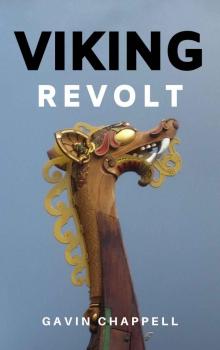 Viking Revolt
Viking Revolt The Londinium File
The Londinium File The Gladiator Gambit
The Gladiator Gambit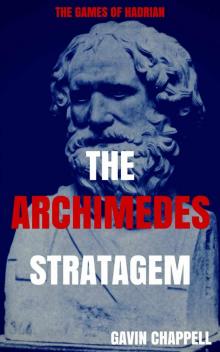 The Archimedes Stratagem
The Archimedes Stratagem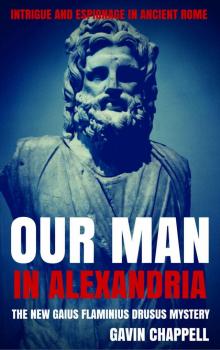 Our Man in Alexandria
Our Man in Alexandria Into the Void (The Dungeoneers)
Into the Void (The Dungeoneers) The Kingdom That Rome Forgot
The Kingdom That Rome Forgot The Guests of Odin
The Guests of Odin